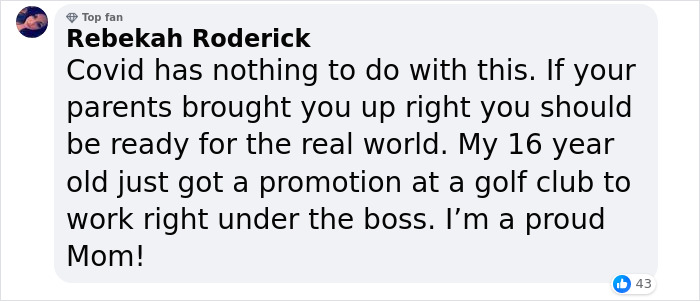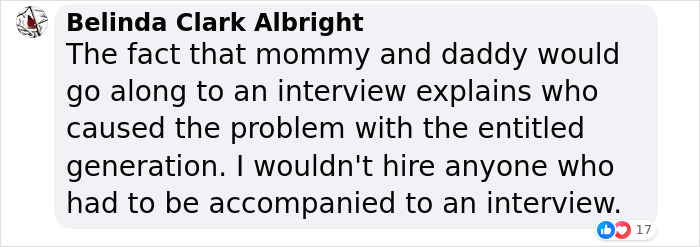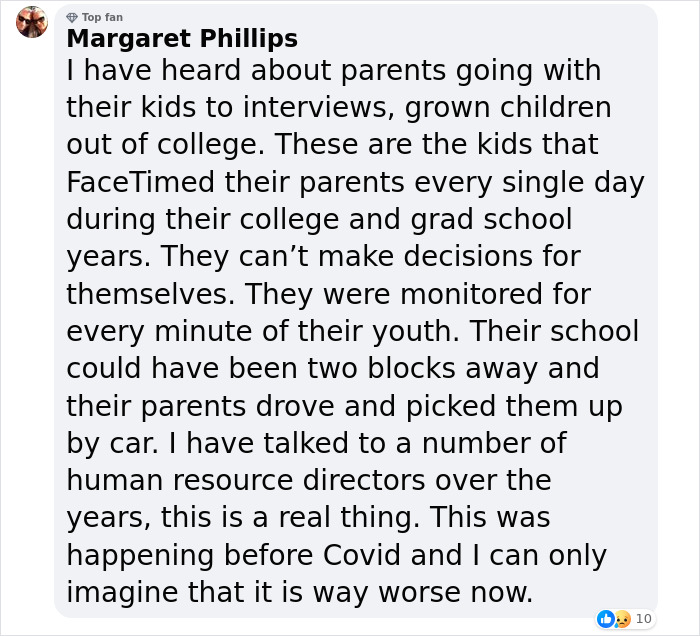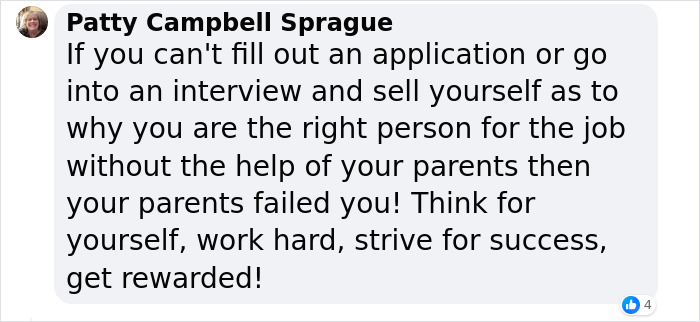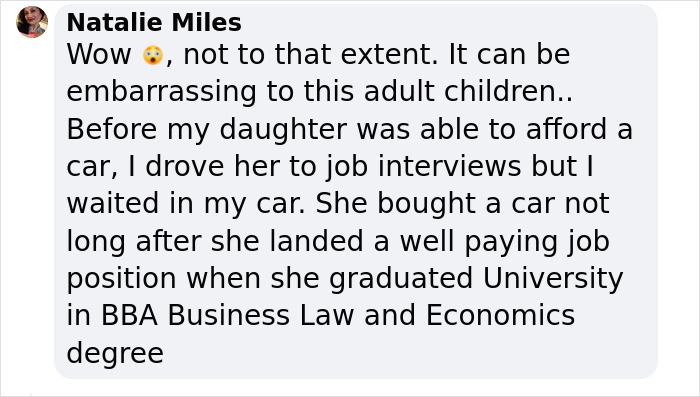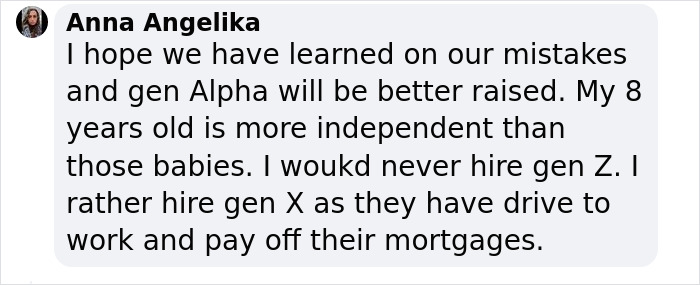You have probably already read more than one of our posts about how parents who live under the same roof with their adult children complain that they do not want to participate in managing the household and don’t even make a financial contribution. Well, it’s time to take the next step – it turns out that young people need the support of the older generation when looking for work too.
And if you thought that we were talking about plain old nepotism, when parental connections help their offspring get a prestigious job, then you are definitely mistaken. What if I told you that many recent college grads bring their own parents to job interviews?
More info: Intelligent
The recent study conducted by a student life and study website found out that the U.S. employers aren’t happy to have Gen Z-ers as their employees
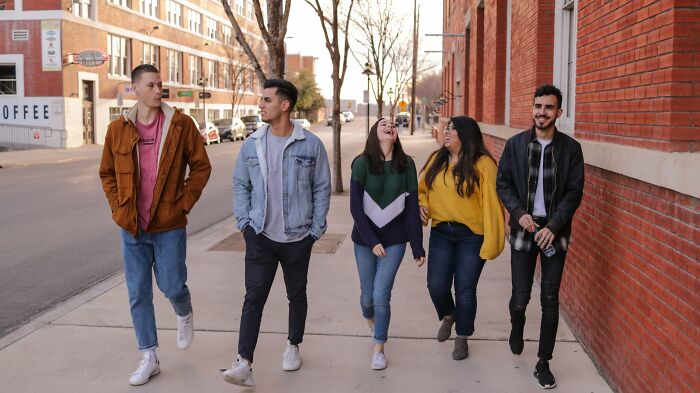
It turns out that 1 in 5 employers have faced young jobseekers bringing parents to job interviews
Don’t believe me? Too bad. And here’s why – late last year, Intelligent.com, an online magazine specializing in education, student life and work, published the results of its broad survey. As part of the study, 800 U.S. managers, directors, and executives who are somehow involved in hiring were surveyed.
Now prepare to be surprised. First, 39% of respondents claim that in the hiring process, if the question arises of choosing between a recent college graduate and an older candidate, then, all other things being equal, they would prefer someone older. Various options are put forth: offering the candidate a higher salary, allowing them to work remotely or in a hybrid format.
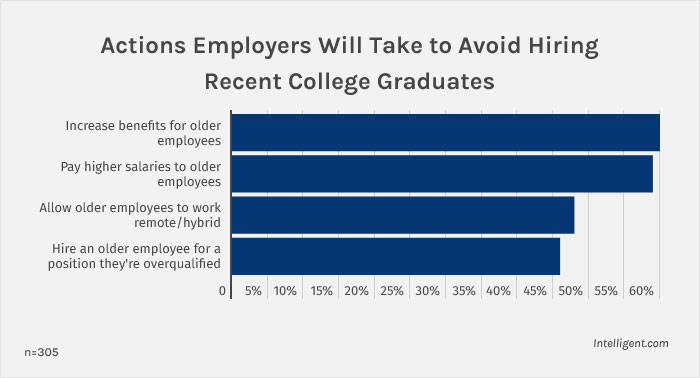
It has even come to the point that if previously, the issue of overqualified age candidates was, if not a red flag, then a significant problem for jobseekers, then now 46% of surveyed employers and HR workers are ready to hire an overqualified person – just to avoid working with Gen Z.
The question is, why? Well, for example, because, according to the same survey, 1 in 5 employers have recently had the experience of interviewing a young person who brought their parents to the interview. Moreover, typically, the initiator of such a situation is not always the youngster themselves. Often it is the parents who insist on their presence during the interview.
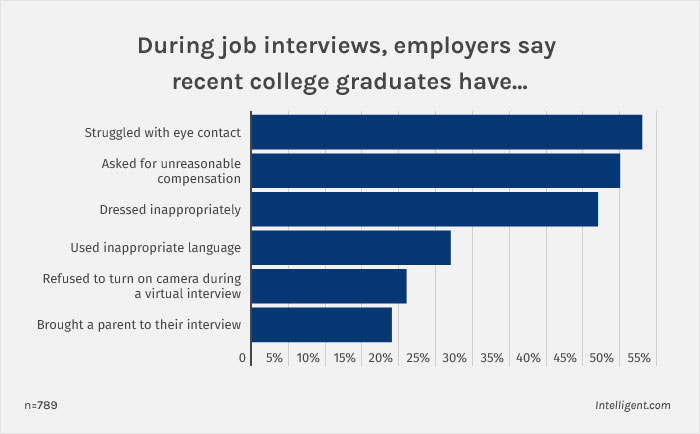
The issue could be related to the phenomenon of ‘helicopter parenting’, in which parents are overly involved in their adult children’s lives
Most likely, we are dealing with so-called helicopter parenting – a term that refers to overly involved and protective parents who not only actively interfere in all their children’s interactions, but also make decisions for them, try to help them achieve their goals, and remove obstacles in their path.
On the other hand, the very concept of ‘helicopter parenting’ first appeared a couple of decades before the current Gen Z-ers were even born – in 1969, in the bestselling book Between Parent & Teenager by Dr. Haim Ginott. Moreover, society first encountered this phenomenon en masse at the turn of the century, when the first millennials went to college. So why is helicopter parenting so pronounced right now?

One of the reasons for this effect might be also the recent pandemics, with millions of students lacking social interactions
“In many ways, the problem lies in the COVID-19 pandemic, when students almost all over the world found themselves for at least a year, and in fact for several years, deprived of the opportunity to interact with other people in the way familiar to all previous generations,” says Olga Kopylova, Ph.D., associate professor of economics at Odessa National Maritime University, to whom Bored Panda reached out for a comment here.
“Historically, university is not only about acquiring skills and knowledge, but also about socialization. Communication with other students, the experience of independent life on campus, skills to overcome problems and obstacles on their way – students of previous generations invariably faced all this and, with varying degrees of success, learned to overcome everything.”
“No, I don’t want to say that the whole problem is only in the pandemic, but current college graduates are less ready for work. In many ways, by the way, some teachers are also to blame for this, since they were unable to efficiently adapt to online classes. But the general trend is unfortunately, pretty obvious,” Olga summarizes.
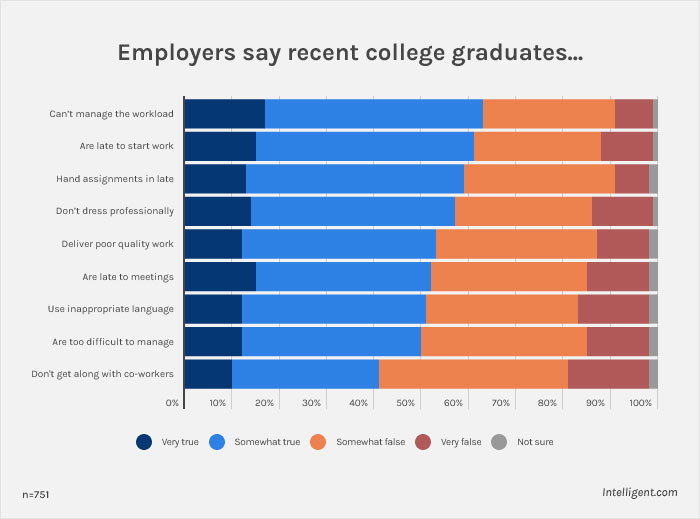
Well, if we remember that the percentage of young people who currently live under one roof with their parents in the U.S. is the highest since the middle of the last century, when applied to the phenomenon of helicopter parenting, much becomes clear. And young people, many of whom, in fact, grew up in greenhouse conditions provided by the older generation, ultimately find themselves unprepared for the workforce. This is evidenced by the results of the study (58% of employers think so), and by recent college graduates themselves too.
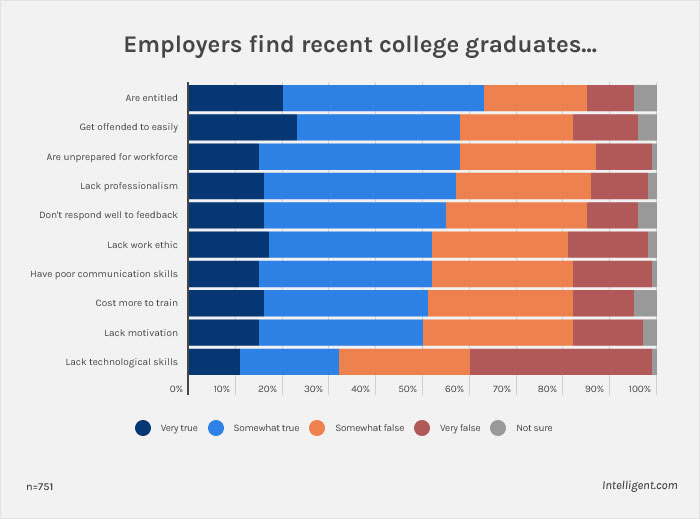
Many employers also opened up that they had fired a recent college grad at least once
And last, but not least, nearly half of the employers who took part in the survey had fired a recent college graduate at least once. According to business representatives, these young employees often can’t manage the workload, are late to meetings and hand assignments in late.
At the same time, new employees are characterized as entitled (63% of respondents), too easily offended (58%), clearly lacking professionalism (57%), not responding well to feedback (55%) and having poor communication skills (52%). No, it’s not worth saying that their businesses were simply unlucky with new employees – we know too well many examples of bosses being entitled, sometimes incompetent and offended easily as well, and any process in society is always a two-way street.

It seems it’s not only an issue in business, but society as a whole
On the other hand, the issue is not only about business. For example, former UK defense secretary Ben Wallace, in a recent interview on LBC, directly stated that Britain’s Armed Forces recruitment effort is in crisis because Generation Z is not signing up to serve. “Generation Z is not joining the Armed Forces in the way my generation did,” said Mr. Wallace. “And, post-Covid, skill shortages in engineering and all sorts of things are a real challenge.”
Who knows, perhaps our society is really entering a difficult stage of its development, when young people are not ready to shoulder the burden that all their predecessors had to bear? Perhaps, because in fact, everything in this life is quite possible. On the other hand, I would like to end with one more quote.
“The more I look at the young, the more convinced I am that they are no good. They don’t know how to do anything, don’t want to learn, and don’t respect their elders. The glory days, when everything was fine, are irrevocably a thing of the past, and I look on with fear into the future…” Do you know who the author of these words is? No? I actually don’t know either – because the author is unknown, and the words themselves were written on a clay tablet found by archaeologists from the time of ancient Babylon, circa the 8th century BC.
Well, some things don’t change over time. And this, you know, is probably the only thing that inspires hope…
Some commenters are strongly convinced this is mostly about parenting as people have raised the whole ‘entitled generation’
